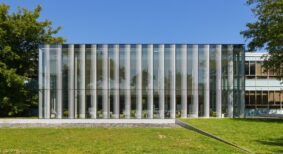A Guelph-based nanotechnology company, with help from university students from across the country, created a coated low-cost, low-energy air filter that effectively deactivates the COVID-19 virus on contact.
Zentek Ltd.’s patent pending ZenGUARD technology, first applied to surgical face masks at the height of the pandemic, is now on the verge of making indoor air quality purer and safer simply by coating the air filters already used in heating, ventilation, and air conditioning (HVAC) systems, in both residential and industrial buildings.
The research is being propelled through an internship program funded by Mitacs — a not-for-profit organization that fosters growth and innovation in Canada and provides students with unique opportunities to work on real-world, leading-edge projects.
In order to bring its innovation to market, Zentek is working with several Mitacs interns from universities across Canada, including the University of Guelph, and the compound behind ZenGUARD was originally invented by Mitacs intern Dr. Seyyedarash Haddadi, a researcher at University of British Columbia Okanagan.
“The magic of this coating is that it’s incredibly safe, it effectively kills all viral and bacterial pathogens, and it’s green,” said Zentek CEO Greg Fenton, explaining that his company’s disruptive technology — which raised $33 million in funding in January 2022 and is currently completing phase two testing through the Innovative Solutions Canada (ISC) program — is an elegantly simple solution. Unlike other air filtration systems that use ionization technology or ultraviolet light, ZenGUARD doesn’t require expensive equipment or consume more energy, he said.
Disruptive antimicrobial coating kills pathogens
“We now know that COVID-19 and other pathogens spread primarily through aerosolized droplets when we cough or sneeze, and that when those droplets get drawn into HVAC systems, they can quickly spread to a much wider area,” Fenton said. “It became very apparent to us that if we could put our coating on filters to trap and kill these pathogens like we were already doing with surgical masks, we would have a wonderful solution for indoor air quality.”
The problem with high-efficiency air filters — like the MERV 13 filters currently recommended to protect against COVID-19 — is that they are more than double the cost of average filters and, because the pores are much smaller, more energy is required to push air through. Zentek’s approach, on the other hand, works with any air filter, at only a small additional cost to filter manufacturers to add the coating and with no impact on energy consumption for the end-user.
Haddadi, who came to Canada from Iran in 2019 as an international postdoctoral researcher, said he is honoured to work with Zentek and to be part of the global fight against COVID-19. He recently accepted a full-time position as Zentek Senior Materials Scientist and is looking forward to continuing to advance his research in nanomaterials.
“When I came to Canada, I did not have any connection with industry and did not know how to go about finding an industrial partner to work with,” said Haddadi. “Mitacs introduced me to Zentek, and now I have this great chance to apply my knowledge to work on one of the greatest challenges facing the world today.”
In June, Zentek opened an industrial-scale antimicrobial production facility in Guelph, one of the largest nanomaterials-based manufacturing facilities in the world. As it moves forward with its rapid growth strategy — doubling in size this past year to 28 employees — it has ambitious plans to commercialize as many as five products in the next three to five years, said Fenton.
In the meantime, as part of the rigorous ISC testing of its new HVAC filter technology, Zentek must demonstrate the safety, efficacy and energy efficiency of its product and is “passed phase one with flying colours,” he added. Results from phase two testing, which involves measuring air quality in a mock classroom environment created at the National Research Council, are expected imminently, and the company is currently working with air filtration partners to commercialize the technology.
“Our goal is to get these filters into homes, schools, hospitals, offices and industrial businesses, as well as onto airplanes, trains and buses,” said Fenton. “This compound is effective against every pathogen we’ve tested it against which means it will work on the next virus to come along as well. We’re on a mission to make people’s lives healthier and safer, and that’s what this technology does.”






